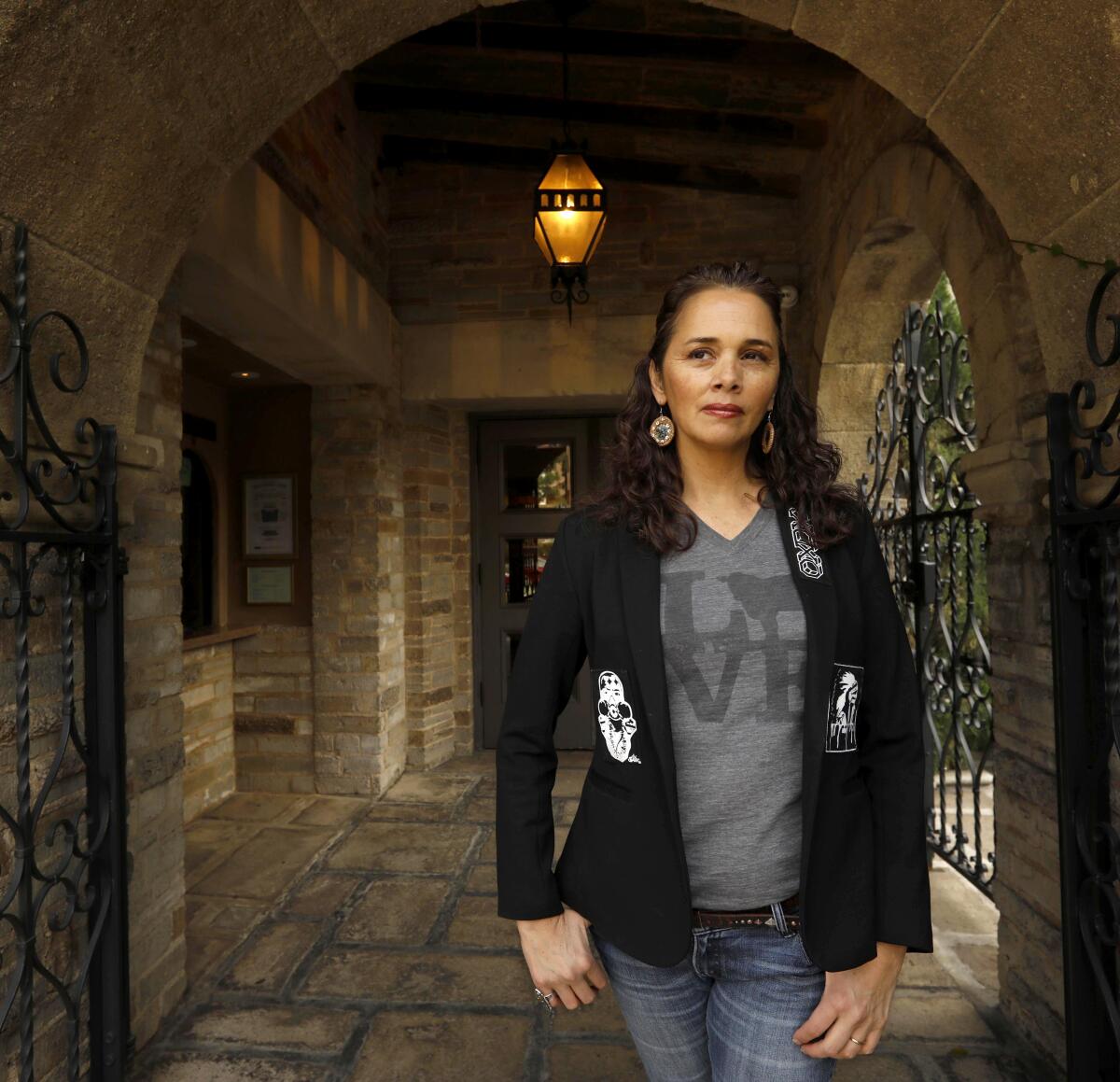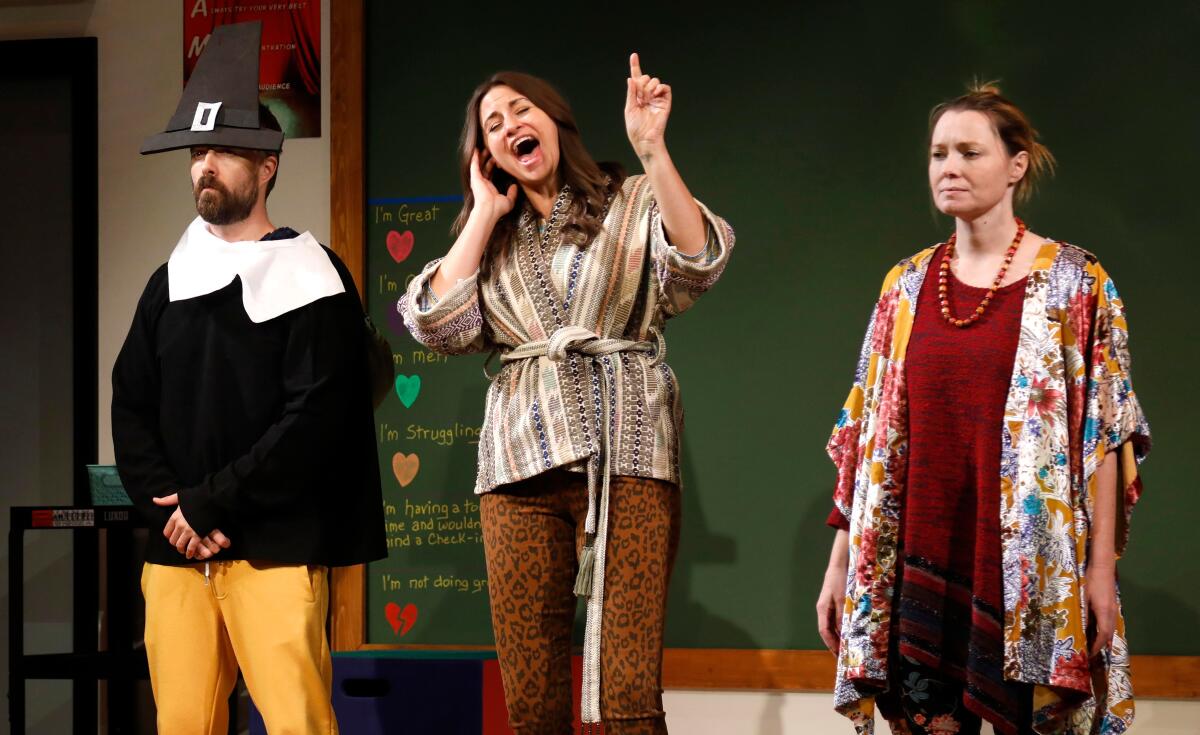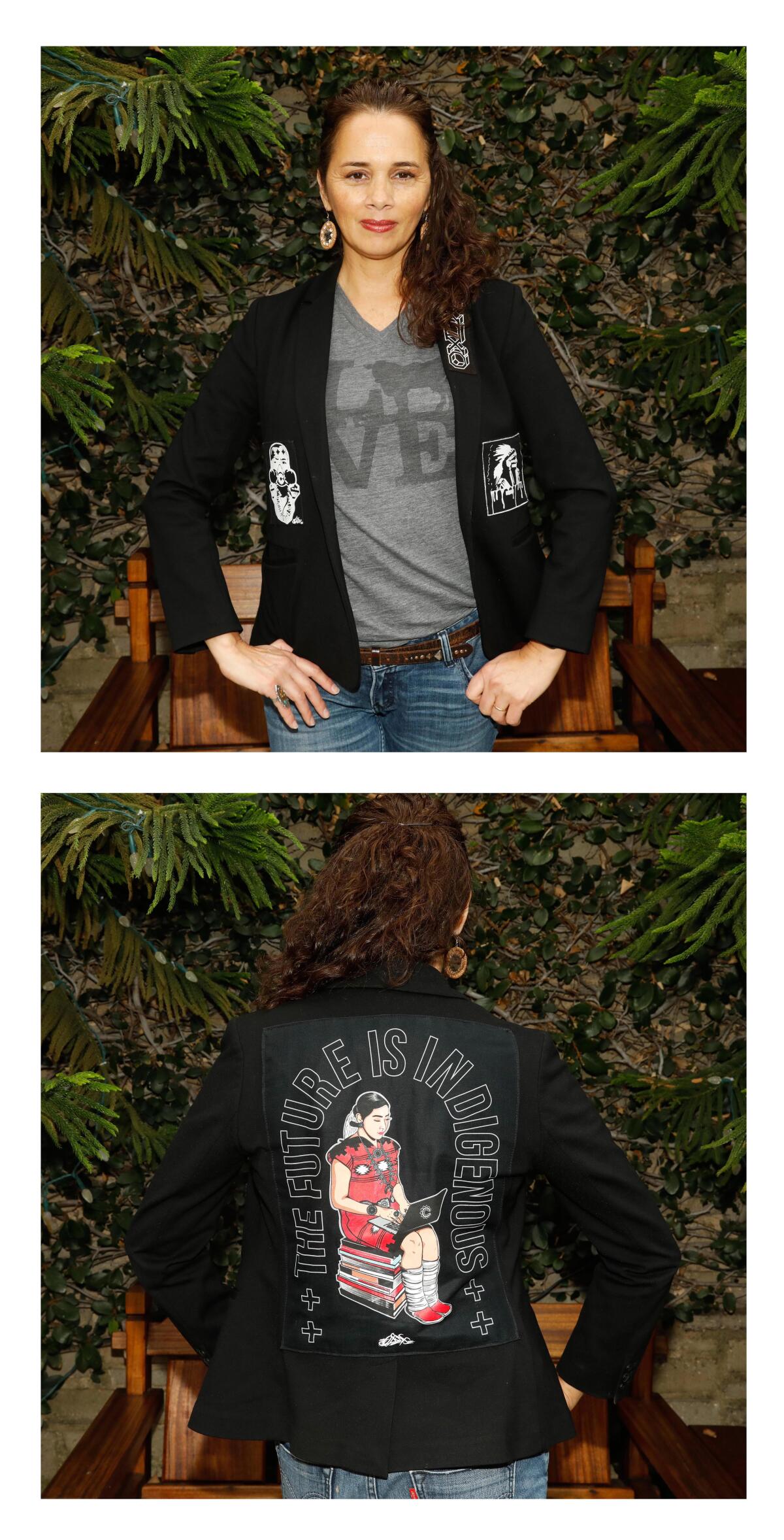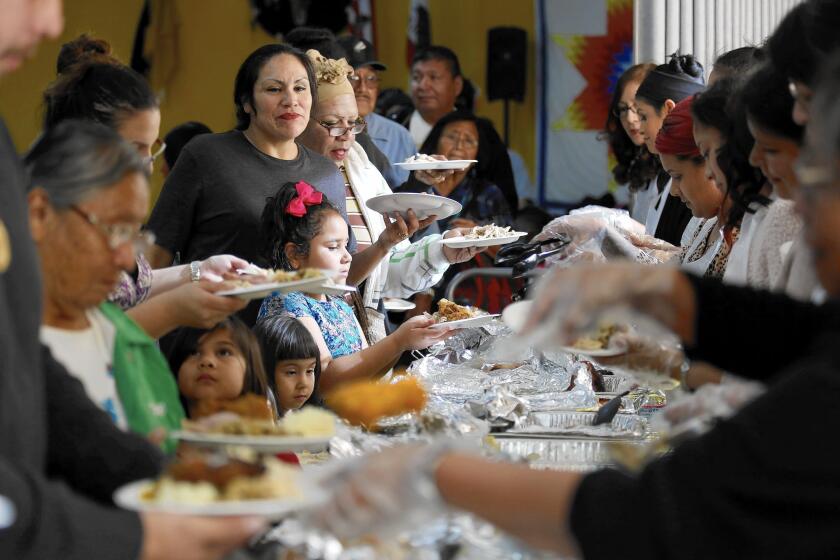Native American playwright Larissa FastHorse is taking down white wokeness

- Share via
Playwright Larissa FastHorse is sorry for ruining your Thanksgiving. Even though she loves the holiday people associate with food and family, her satirical “The Thanksgiving Play” skewers the mythology of Pilgrims and Indians finding peace through breaking bread.
Opening Tuesday at the Geffen Playhouse, “The Thanksgiving Play” centers on a group of “woke” white thespians who struggle to devise a historically accurate and culturally sensitive elementary school pageant that celebrates both Thanksgiving and Native American Heritage Month.
Since premiering last fall at New York’s Playwrights Horizons, the work has been a hit, landing among American Theatre magazine’s annual ranking of the 10 most produced plays for the 2019-2020 season. “The Thanksgiving Play” has been slated for Tampa’s Jobsite Theater, the Lyric Stage Company of Boston and Warehouse Theatre in Greenville, S.C., among others, making FastHorse the first Native American or indigenous playwright to appear on the list.
The 48-year-old calls it her most depressing success.
For the past 13 years, she has written plays that center the contemporary indigenous experience in the U.S. with at least one Native character. But FastHorse kept hearing from theaters that her plays were “uncastable,” even in major American cities.
My gift is as a translator. What I can do well is take indigenous contemporary experiences and translate them for white audiences because that’s what we have.
— Larissa FastHorse
So she made the strategic choice to write “The Thanksgiving Play,” which features four white or white-passing characters.
“I was just getting really annoyed and frustrated,” she said during a break from rehearsal at the Geffen. “Audiences want to learn about Native people because we don’t get it in our education system. The arts are really the only place we learn about Native people anymore.
“But I’m going to give it in one location — 90 minutes, four white people ... if you don’t produce that, then we have a different discussion we have to have.”
She wrote the play in 2015 during an artist retreat in Ireland, settling on Thanksgiving, a topic universal to the American experience and particularly charged in Native communities. “There’s a lot of counter Thanksgiving movements and recognitions on that date that are different from the Pilgrim thing that we’re usually told about,” she said.

Growing up in South Dakota during a period when government attempted to reconcile with indigenous communities, FastHorse “didn’t have Columbus Day, we had Native American Day,” she said. “We didn’t have Thanksgiving, we never did Pilgrims and Indians in school, so I never had that experience.”
She was appalled to stumble on teacher Pinterest boards filled with racist Thanksgiving-themed learning games for students. Amalgamations of those games became interstitials in the play. In the opening, the cast sings a preschool counting song about stereotypical Native “gifts” — teepees, bows and arrows, moccasins, headdresses — to the tune of “The Twelve Days of Christmas.”
Michael Reifel was 10 years old when his parents’ complicated relationship with Thanksgiving started trickling into conversations during the holiday feast.
A play about the process of making a play, the work is also a critique of the world FastHorse inhabits, “which is the liberal, well-meaning, white theater world,” she said. “People are trying so hard to do the right thing, trying so hard to be diverse, trying so hard to include everybody that they just become paralyzed.”
She calls “people being afraid of offending” the biggest enemy of her career as a Native American woman.” That means they’re not going to have me in the room because they’re probably going to offend me anyway,” she said. “We’re not taught indigenous history, not taught about indigenous contemporary experience, we just don’t know.”
“The Thanksgiving Play” is both FastHorse’s breakthrough and the work most palatable to white audiences — an experience she says she shares with other playwrights of color.
But writing specifically to white people is necessary. “They’re still the majority for a few more years,” she said. “They’re also still the majority in positions of power and money.”
She emphasized that the play is a comedy, and during runs of the show last year, the theater was filled with laughter. “I want people to just have fun but also then learn some things along the way,” she said. And although it’s not set in L.A., many of the jokes — vegan allies, actor-yoga-bros — are specific to the SoCal experience. “I’m serving up some of the craziness of L.A. with all the love I feel for my adopted home.”
A dual citizen of the Sicangu Lakota Nation and the U.S., FastHorse began her career as a ballet dancer at Atlanta Ballet. After moving to L.A. and dancing for companies including the shuttered L.A. Classical Ballet and Los Angeles Modern Dance and Ballet, she retired at 30 and worked with a counselor from the L.A. organization Career Transition for Dancers, who helped her find script writing.
She began working in film and television, but they weren’t a good fit. “They weren’t as open to accurate portrayals of Native people,” she said. “They were very much watering things down to a point that I just felt like it wasn’t the right place for me.”
Her first play, “Average Family,” about an urban Native American family and a rural white family on a TV reality show set in the 1840s, was commissioned by the Children’s Theatre Company in Minneapolis in 2007. “I was really pleasantly surprised to see that theater wanted to do things the way I wanted to do them; they wanted to get things right,” she said.

Since then, she’s written and choreographed other plays including the 2008 “Teaching Disco Square Dancing to Our Elders: A Class Presentation,” which revolves around three 14-year-old Lakota teens and was produced by the Autry Museum’s theater company, Native Voices; and the 2017 “What Would Crazy Horse Do,” a dark comedy about the last surviving members of an indigenous tribe who team up with the Ku Klux Klan, staged at Kansas City Repertory Theatre.
Michael John Garcés, artistic director of L.A.’s Cornerstone Theater Company, first met FastHorse about 10 years ago and worked with her on the company’s 2016 immersive production “Urban Rez,” which focused on the experience of Native Americans from Southern California.
Garcés, who is also the director of “The Thanksgiving Play,” called FastHorse’s work “fearless” in the way she tackles historical trauma. “She does it with humor and yet also real frankness, and is not afraid to be fairly bold in making audiences grapple with both what they’re laughing at and where we are now,” he said.
Recently, FastHorse made a return to film and television, saying the entertainment world has changed, becoming more “aware of representations of accuracy,” since she got her start over a decade ago. She’s developing productions including a TV movie about a Native American woman on a lacrosse team.
Native American viewers of PBS’ landmark children’s program “Molly of Denali” describe the series, set in an Alaska Native village, as meaningful beyond words.
But as a Native artist, FastHorse still struggles with the overall lack of awareness around indigenous issues. “I feel like I just live with this endless, low-lying rage and you have to laugh or cry or scream,” she said.
It’s something she’s trying to change.
Whenever she receives a commission from a theater, she also issues a demand: Her work can’t be the only Native art in a season, and she can’t be the only indigenous person paid. FastHorse then strategizes with theaters to build relationships with Native communities, consider acknowledging the Native land on which a theater might be built, and lift up other Native voices.
“I got into playwriting not just to write plays but to change the field,” she said. “My gift is as a translator. What I can do well is take indigenous contemporary experiences and translate them for white audiences because that’s what we have.”
'The Thanksgiving Play'
Where: Geffen Playhouse, 10866 Le Conte Ave., Los Angeles
When: Opens Tuesdsay, ends Dec. 6. Performances 8 p.m. Tuesdays-Fridays, 3 and 8 p.m. Saturdays, 2 and 7 p.m. Sundays
Tickets: $30-$120
Info: (310) 208-5454, geffenplayhouse.org
Running time: 1 hour, 30 minutes
More to Read
The biggest entertainment stories
Get our big stories about Hollywood, film, television, music, arts, culture and more right in your inbox as soon as they publish.
You may occasionally receive promotional content from the Los Angeles Times.












